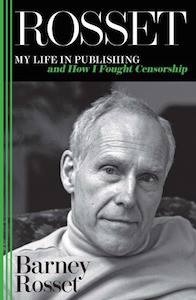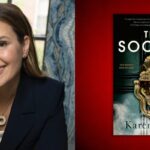
The Publishing Gamble That Changed America
The Late Barney Rosset on Fighting for Lady Chatterley's Lover
In 1954, when Grove Press was still in its infancy, Mark Schorer, the distinguished literary scholar and professor of English at Berkeley, wrote to me suggesting that we publish an unexpurgated edition of Lady Chatterley’s Lover. D. H. Lawrence’s last major work had long been banned in England and put on the “proscribed” list by the United States Post Office Department. Now, Professor Schorer, whom I had never met in person, had placed the Lady on our doorstep. Here she was, waiting for her liberator. If we could prove to the satisfaction of the US courts our claims for the artistry of Lawrence as a writer and the specific merits of Lady Chatterley’s Lover as literature, the victory for freedom of speech would be tremendous. It would be a savage kick in the face to Death and a lovely kiss to Life. What was more, it could afford me the opportunity to publish the novel I really had wanted to put out into the public sphere since my college days at Swarthmore: Tropic of Cancer. This was clearly a Trojan horse for Grove. If I could get Lawrence through, then Henry Miller might surely follow.
Lawrence, with Italian publisher Giuseppe Orioli in Florence, had privately issued a 1,000-copy signed limited edition of the third and final manuscript version of Lady Chatterley in 1928, despite the disapproval of his British agent, Curtis Brown, and his publisher in English, Martin Secker. Orioli’s efforts were largely in vain. Though a number of copies of this edition of the book, in mulberry-colored paper boards, got out, others were seized and banned in both England and the United States.
After Lawrence’s death in 1930 at the age of forty-four, the truly obscene result for Lady Chatterley’s Lover came in the form of the 1932 publication of an “expurgated” version by Secker in England and Alfred A. Knopf in the United States.
What was it that these publishers hoped to accomplish with this cleansing process? Were clean living and clean reading synonymous and equally meritorious? And who on earth did Knopf and his British equivalent choose to do the dirty work of purging our Lady of her dirty thoughts? How did these unnamed designated hitters choose which words, phrases, and paragraphs to swat out of the book? Any competent, “decent” publisher would have had a hand in choosing his home-team purifier. After all, it was his (in this case, read Knopf’s) team. And what possibly did “expurgating” mean if not cutting out something already made illegal by our government, something supposedly dangerous, like absinthe. So, the Knopf “expurgated” Chatterley was deconstructed from the original to something along the lines of the de-sexed versions of Ovid given out to prep school Latin students, a kind of methadone before its time. It angers me to this day.
My thinking was, and is, that Knopf was effectively in collaboration with our Post Office in the evisceration of Lady Chatterley. They had left an attractive corpse, but her guts, her heart, her brain, and yes, her soul, were gone. Everything D. H. Lawrence had so wanted and worked to achieve with this particular and very special book had been thrown away.
Lawrence’s widow, the now remarried Frieda Lawrence Ravagli, had always stood by him, including in his efforts to get Lady Chatterley’s Lover published. But after he died she seemed overwhelmed by the august weight of the fraternity of publishers and agents she had to deal with, and bowdlerized editions started to appear. Perhaps if her deceased cousin, the German fighter pilot Baron Manfred von Richthofen—the “Red Baron,” probably the most famous ace of World War I—had still been around, the situation might have taken a different turn plus a barrel roll dive or two on the censors!
Alfred Knopf was not famed for his fighting propensities where censorship was concerned. However, he was right up there among the pretenders to the gentleman publisher’s crown, so it was natural for him to follow the leadership of his English peers. For myself, I had no aristocratic pretensions to guard. I was ready if necessary to face being called a profiteer from smut. Henry Miller and his publisher, Jack Kahane of Obelisk Press in Paris, had already suffered through that, and Samuel Beckett had recently written to me, warning of what might lie ahead in the way of censorship in relation to his own work.
I was ready to fight if I thought I had the right books and authors to fight for, and now, thanks to Mark Schorer’s suggestion, I did. It was time to challenge the Post Office to take us on. If necessary, we would take the fight to them. By shutting out Lady Chatterley’s Lover, the censors would unwittingly create a weak point in the censorship wall. If companies with adequate funds and high literary pretensions could not step forward to exploit that exposed weakness, we would replace them.
Censors fell upon the unexpurgated version of Lady Chatterley’s Lover because Lawrence, like lava flowing from a volcano, had inexorably gone on demanding a return to a more natural state—a lyrical one—in the relation between the sexes. He had set about trying to demolish the false restrictions on human relationships. He insisted on describing sexual episodes explicitly, and moreover, he was determined to give old Anglo-Saxon four-letter words their proper place in literature. When his book was banned in England, and dumped into the inventory of something called the US Collector for Restricted Merchandise Division, Alfred Knopf was not about to rescue it, and he found allies among some high-ranking academics who thought it fine for themselves to read Lady Chatterley’s Lover, but dangerous for those less accredited.
The assumption was that most of us were susceptible to being corrupted, but a special few were not.
There was more to Lady Chatterley to offend the censors than its four letter words and graphic lovemaking. The book, our self-appointed guardians felt, was written in a manner that was relatively easy to read. It was approachable. And they feared, rather than hoped, that it might be read by millions. They shuddered to think of all those lewd thoughts infecting the receptive souls of so many Americans, especially those impoverished by small incomes and miserable education.
As federal prosecutor S. Hazard Gillespie, Jr. would later state in a case against Grove, Mellors, the male protagonist in the novel was a gamekeeper and the heroine was an upper-class lady. This really upset the guardians of morals and class privileges. I felt from the outset that if it had been the reverse, a lord of the manor having sex with a pretty servant girl, it would have been all right. Also, the couple in Lawrence’s novel had too much fun with sex. That would never do. It might be contagious.
To trigger the fight, I wrote to Joan Landis on March 31, 1954, who had worked for me at Grove in the early 1950s as a Bennington College intern, a most competent one and muy simpático. Originally directed to me by Wallace Fowlie, she was then living in Paris with her American husband. I asked Joan to buy four copies of the unexpurgated edition of Lady Chatterley’s Lover and send them to me in New York. They were mailed on April 22. And then to guarantee that the books would not slip by some careless customs agent, I wrote to the New York Customs Service (now known as US Customs and Border Protection) notifying them that the books were en route. If you are intent on having a duel you have to notify your opposite number.
A month went by with no word. We were told that a delay of a month or so was not unusual for overseas parcels. But after a while when we hadn’t received the books, I assumed they had been seized, though I had no official word one way or the other. So I asked Joan to airmail me an additional copy.
When I received the airmailed copy, I again wrote the Customs Service informing them that they had let Lady Chatterley’s Lover slip through. Shame on them, I added. I then promptly redelivered it to their New York office to make sure they knew that this dangerous book had indeed arrived on our shores.
New York Customs did not want to be responsible for making a gaffe. Probably they did not want to risk a lawsuit from Grove Press or somehow being made to look like fools. This bureaucracy, even at the crest of its self-appreciation, decided that sending it up to another level was the prudent thing to do. So they dispatched the book to Washington, where the Collector for Restricted Merchandise—one of the more arcane departmental heads of our government—was to act as judge. I envisioned him ensconced in the deepest basement of the US Post Office building, the American equivalent of the Vatican’s subterranean library of proscribed literature and art.
It wasn’t until August 11 that Irving Fishman, Deputy Collector for Restricted Merchandise, offered an official position:
The book in question is obscene within the meaning of Section 305 of the Tariff Act of 1930. This book will therefore be seized and forfeited in due course as provided by law.
The Mikado was in residence! His Lord High Executioner was ready to perform! It had taken months to get our gallant Lady Chatterley into trouble with the law, but now I had a basis for a suit against the federal government challenging its right to ban her. The gauntlet had been thrown down. It soon became apparent the Post Office was not about to be outdone by Gilbert and Sullivan.
Our case against the banning of the book—one that would later come into play during our battle to publish Tropic of Cancer—was based from the beginning on the concept of “literary merit.” For me, there was a little taint of convenience attached to that concept. Nonetheless, it was the best ammunition at hand. It was also our law.
Next, I asked Mark Schorer to write an introduction for our edition to further this concept of literary value. To me, what he wrote still stands as one of the preeminent studies of D. H. Lawrence’s book. At our request, Schorer visited Frieda in Taos, New Mexico, where she gave him access to all three manuscript versions of Lady Chatterley’s Lover. His account of the development of the final, unexpurgated draft demonstrated how vigorously Lawrence had struggled to perfect his novel as a work of art. The scholarly apparatus Schorer provided for our edition would later be of great help in the courtroom. If there was ever any desire on Schorer’s part for profit, I never knew about it. The only fault I ever noticed in Mark was his affection for the Harvard Club. At the time, its bar was for men only. To me that condemned it before I ever entered, but to accommodate him and my attorney, Charles “Cy” Rembar, who was to be so crucial to the Miller lawsuits, I went to this blasphemous den more than once. (For the record, my lawyer in the initial stages was Ephraim London.)
I wrote to many critics, scholars, and attorneys seeking support for our claim that the book was of significant literary value and by no means obscene. Not all responded favorably, but many did, helping to build our basic defense.
Bennett Cerf, co-founder of Random House, who had won the landmark obscenity case against James Joyce’s Ulysses, took me by surprise. He was one of the publishing gentry, but was nevertheless approachable and somehow, to my mind, vulnerable. But on Lady Chatterley’s Lover he almost derailed us. In reply to my plea for support he wrote, “I can’t think of any good reason for bringing out an unexpurgated version of Lady Chatterley’s Lover at this late date. In my opinion the book was always a very silly story, far below Lawrence’s usual standard, and seemingly deliberately pornographic . . . . I can’t help feeling that anybody fighting to do a Lady Chatterley’s Lover in 1954 is placing more than a little of his bet on getting some sensational publicity from the sale of a dirty book.” Still, I liked Cerf and more or less ignored his nasty response. Despite his initial reaction, ultimately he would become a good and valuable friend in the battle for Lady Chatterley.
Bennett Cerf aside, I received more than enough favorable support to proceed. Jacques Barzun, the cultural historian, wrote:
I have no hesitation in saying I do not consider Lawrence’s novel pornographic. Its aim is that of all his work: artistic, moral and indeed inspired by a passion to reform our culture in ways that he thought would produce greater harmony, happiness, and decency.
And Archibald MacLeish responded:
Only those to whom words can be impure per se or those to whom “certain subjects” cannot be mentioned in print though they are constantly mentioned in life, or those to whom the fundamental and moving facts of human existence are “nasty” could conclude on the evidence of the text itself that Lady Chatterley’s Lover, as Lawrence wrote it, is obscene.
Lawrence’s original edition of Chatterley was not in copyright. When he and Orioli brought it out, the book immediately became public property as far as publishing rights in the United States were concerned. Indeed, as I recall, when Knopf published the expurgated version in the United States in 1932, he did not even bother to register copyright. That further hardened the fact that anyone who wanted to publish it could do so without interference from the copyright office or any other publisher. Only the threat of arrest for publishing obscenity would remain.
I wanted to present the book in the best way possible. Although Ephraim London assured me Chatterley was in the public domain, that is, unprotected by copyright and publishable by anyone, with no strings attached, I wanted, emotionally and pragmatically, to have a signed agreement with Frieda Lawrence. I asked Mark Schorer to speak to her, and through him I offered her a ten percent royalty on all copies sold, although I was not obligated to do so.
Frieda, understandably, was quite confused about the legal technicalities. “I have the copyright,” she wrote, “but Knopf has the publishing right. . . .”
I wrote to her explaining that legally there was no copyright, but that I would much prefer to have her “agreement and enthusiastic support.”
All she could bring herself to do was wish me good luck. God bless her for that.
In England, Frieda was represented by Laurence Pollinger, a literary agent who had worked for Curtis Brown. Unlike Brown, he had supported Lawrence’s decision to publish the private, limited edition. Pollinger had by this time formed his own firm and became a dominant influence on Frieda, controlling Lawrence’s literary property, not to mention Frieda’s income. When he learned that Grove was considering an American edition of the unexpurgated Lady Chatterley’s Lover, although he knew that on legal grounds no one could stop us, he was adamantly against it. Could it have been that some sort of social snobbery and class loyalty was intruding again? I think so.
There were other obstacles. A Knopf executive, William Koshland, whom until then I had considered a friend, wrote to the American agent Allan Collins with instructions concerning Grove. Collins telephoned me and reported that Knopf considered himself the only authorized publisher of the US edition of Lady Chatterley’s Lover, and that version was now under license to the paperback house New American Library. Further, Collins went on, if Grove succeeded in winning a positive court decision in our censorship case, Knopf would expect to be the publisher. Thus, Alfred Knopf used a literary agent to let us know his stand. On the one hand he didn’t think an unexpurgated version could be published here. And on the other, if it could be, he intended to do it himself, thus benefiting from our expensive court actions, leaving Grove—which had far less clout than Knopf—in serious, precarious financial difficulties. Ultimately, he did not do that, but New American Library and others would take advantage of Grove’s legal battle on behalf of the book. His stance was a preview of things to come. He couldn’t prevent Grove from going ahead but, ultimately, to his credit, he did not carry out his threat. Still, it was hardly a gentle kind of coercion.
Most of the negotiations on the rights for Lady Chatterley’s Lover were conducted in the spring and summer of 1954. At the time I had little money to work with. My father had helped me out until his death in September 1954, but the sums he contributed were relatively small, in line with the $3,000 paid for the original Grove Press and its inventory of perhaps a thousand paperbacks, which I had stored in the third floor apartment of the brownstone I lived in on West Ninth Street in Greenwich Village. I could not ask him to finance such an open-ended gamble as a long court case for a book whose rights I didn’t even own. After his death, although my mother was willing to help, I found myself embroiled in a hands-on fight with the bank that had been named co-executor of my father’s estate with me—the Continental Bank. The money was to be put in a trust for my mother for as long as she lived, and the remaining funds would go to me. Obviously, the situation was not conducive to freeing up money for the Lady Chatterley battle against censorship.
I was co-executor, with the biggest bank in Chicago, of my father’s estate. What I did was rather incredible—I can now see this in hindsight. I took my father’s bank, Metropolitan Trust Co., and merged it with Grove Press. Practically overnight Grove consisted of paperback and hardcover books and 90-day US government bonds! Both were confected from paper, but that was the only similarity. Predictably, the Continental Bank, my co-executor, objected.
Suddenly I was involved in a two-front war—the kind of war I had been taught by Karl Marx to most assiduously avoid. Some people might have considered the Continental Bank tougher and more dangerous than even the US Post Office. It had to be settled by a mixture of court action and guerilla warfare. And it was.
I did not lose, but I emerged from the battle with a significantly diminished inheritance for my mother and ultimately myself. However, my insightful, wonderful mother, to whom the estate had been left, and who stood to lose the most if merging Grove and the Trust Co. proved to be a disaster, enthusiastically endorsed my most unusual request to the court to dismiss my co-executor, the Continental Bank.

FROM ROSSET: MY LIFE IN PUBLISHING AND HOW I FOUGHT CENSORSHIP. Used with permission of O/R Books. Copyright © 2016 by Barney Rosset.
Barney Rosset
Barnet Lee "Barney" Rosset, Jr. (May 28, 1922 – February 21, 2012) was the owner of the publishing house Grove Press, and publisher and editor-in-chief of the magazine Evergreen Review. He led a successful legal battle to publish the uncensored version of D. H. Lawrence's novel Lady Chatterley's Lover, and later was the American publisher of Henry Miller's controversial novel Tropic of Cancer. The right to publish and distribute Miller's novel in the United States was affirmed by the Supreme Court of the United States in 1964, in a landmark ruling for free speech and the First Amendment.


















